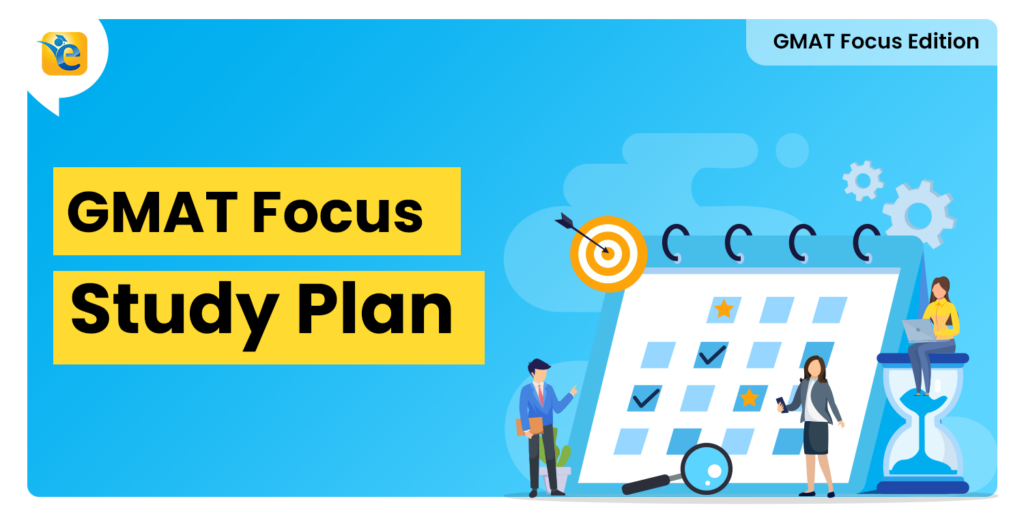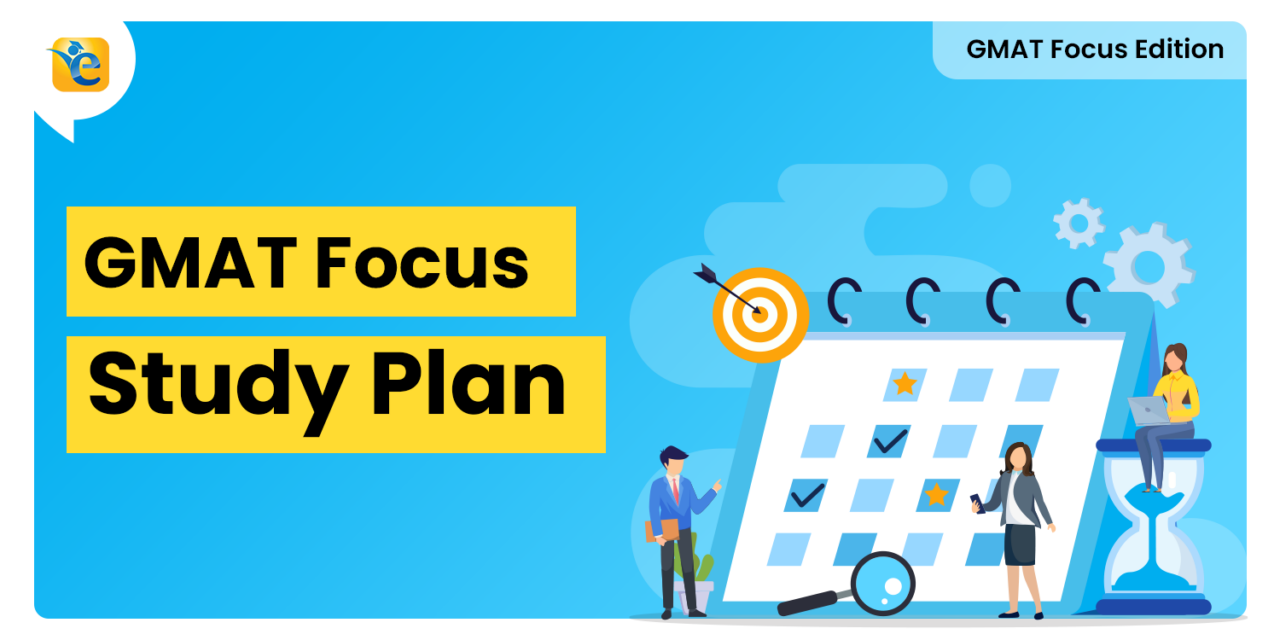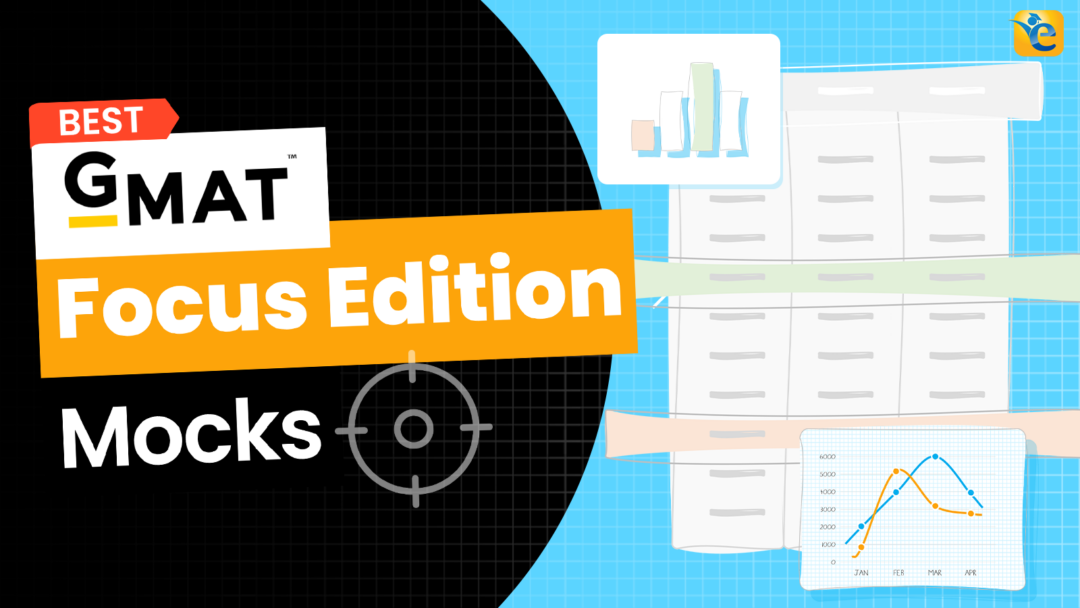The goal of this article is to give you a framework to build a GMAT Study plan if you are planning to take the GMAT Focus Edition. For e-GMATers, our new PSP (Personalized Study Planner) for GMAT preparation embodies the principles outlined in this article and does 99% of these steps for you. This article will also give you an overview of the considerations that the PSP tool takes into account while recommending your personalized path forward for the GMAT preparation.
Start GMAT Prep Now
Unlock the best preparation resources at absolutely no cost! Answer a few questions related to your prep journey, and receive personalized feedback to start your preparation.

- What does a study plan do?
- Your Personalized Study Plan in 5 Steps
- How to create a GMAT study plan?
- Summary and Helpful Links
What does a study plan do?
A personalized study plan does two things:
- It helps you channelize your preparation to ensure that you have the highest chance of achieving your target GMAT score.
- It ensures that you reach your target GMAT score in the shortest possible time.
A well-made study plan does three things :
- Time estimate: It gives you a time estimate in terms of the number of hours you will need to reach your target GMAT score.
- What to study: For each component of the test, it tells you where you should put this effort; based on your strengths and weaknesses, it tells you how much time you should invest in learning concepts, mastering application n, and cementing core skills.
- Metrics: A good study plan also gives you metrics you should achieve to reach your target score.
Overall, even though you may need to invest about five hours to build a personalized study plan, these five hours may help save hundreds of hours of effort. Moreover, this may significantly increase (2X to 5X) your chances of getting to that target GMAT score.
Start your GMAT Focus journey with our free GMAT Focus mock test to gauge your baseline score, and then create a personalized study plan. Dive into our free trial for targeted prep. Trusted by thousands with 2700+ reviews on GMAT Club, e-GMAT is your partner in mastering the GMAT. Contact us at support@e-gmat.com for expert guidance.
Your Personalized Study Plan in 5 Steps – GMAT Focus Edition Prep
Let’s discuss how to make a Personalized study plan for the GMAT focus edition prep:

How to create a GMAT study plan?
5 steps on how to make your GMAT study plan:
- Decide on the Target GMAT Score
- Get Your Score Baseline
- Define Target Sectional Scores
- Translate Those Target Scores to Metrics
- Decide Sequence of Study and Follow the Best Practices
1) Decide on the Target GMAT Score:
The first step to building your study plan for the GMAT focus prep is deciding on your target GMAT score. Your target should align with the admission requirements of the business schools you aspire to attend. Research the median GMAT scores of accepted students at these schools and take into consideration your own professional and academic profile.
If you have an excellent profile – stellar work experience, impressive academic record, strong recommendation letters, etc., – and your primary objective is to demonstrate that you can handle the coursework, aiming for a median score of your chosen school may suffice. This shows the admission officers that you meet the academic standards necessary for success in their program.
If you want your GMAT score to further enhance your candidacy, consider aiming for a score that is around 30 points higher than the median score of accepted students at your chosen schools. This can make your application stand out and can significantly increase your chances of acceptance.
If you’re seeking a significant scholarship, consider setting an even more ambitious goal. Aiming for a score in the 98th percentile is typically associated with the highest level of academic scholarship opportunities. This score will not only increase your chances of acceptance, but also potentially provide financial support for your studies.
Remember, the target score you set should be ambitious but realistic. It should serve as motivation for your preparation without causing unnecessary stress. Tailor your target score according to your individual circumstances and objectives, as well as the requirements of the schools you’re aiming for.
2) Get Your Score Baseline:
Before beginning your study plan, understanding your current performance level is crucial. To do this, you can get a baseline score by taking a SIGma-x GMAT Focus mock test . These tests simulate the real GMAT to give you a good idea of where you stand before you start studying.
Taking one of these mock tests will not only give you an overall score, but also provide you with valuable data on various components of your performance:
- Your Sectional Ability Score: The test will provide you with scores for the Quantitative, Verbal, and Data Insights sections. Each of these scores will be out of 90, and the test will also provide you with corresponding percentile scores. This information can help you understand your relative strengths and weaknesses in these areas compared to other test takers.
- Your Sub-sectional Abilities: In addition to the sectional scores, the test will also provide you with scores for eight sub-sections. This breakdown can give you even more insight into your specific abilities and areas for improvement. The table below provides all the sub-sectional ability scores that you need to extract.
| S.No | Section | Subsection |
| 1 | Quant | Arithmetic |
| 2 | Quant | Algebra |
| 3 | Verbal | Critical Reasoning |
| 4 | Verbal | Reading Comprehension |
| 5 | Data Insights | Data Sufficiency |
| 6 | Data Insights | GI and Table Analysis |
| 7 | Data Insights | Two Part Analysis |
| 8 | Data Insights | Multi Source Reasoning |
Understanding these data points is important as it forms the foundation of your study plan. By knowing your starting level, you can better target your studies to the areas where you need the most improvement. It also allows you to track your progress as you prepare for the GMAT, helping you make adjustments to your plan as necessary. Remember, the goal is not just to get a high score, but to show consistent improvement and competency in all tested areas.
3) Define Target Sectional Scores
This is an extremely critical step in GMAT focus edition prep. A wrong decision at this stage will channel your energy in the wrong direction and can lead to wastage of several hours of effort, to frustration, and, eventually, to failure. Before going to the chapter on framework for target sectional score, understand the importance of arriving at Sum of Scores.
e-GMATers do not need to worry about doing all this optimization since our proprietary PSP and PSP for GMAT focus run sophisticated algorithms to provide them with an optimized set of target score options based on each student’s strengths and weaknesses.
Context: Your GMAT Focus score is a linear function of the sum of sectional scores in the three sections – Quant, Verbal, and Data Insights. Each of these sections is scored out of 90. Furthermore, each of these sections is independent and plays an identical role in determining the score out of 805.
Takeaway: To achieve a score out of 805, we need to achieve a specific “Sum of Sectional Scores”. The table below gives the relationship between Sum of Sectional scores and your GMAT Focus score out of 805.
Final score of 655 – 93%ile with sum 247 regardless of the relative performance in the three sections. Note that DI performance in the second simulation is abysmal; while the first simulation is well-balanced across all three sections.
| DI Score (Percentile) | Verbal Score (Percentile) | Quant Score (Percentile) | Sum of Scores | GMAT Focus Score (Percentile) |
| 78 (73 %ile) | 85 (96 %ile) | 84 (85 %ile) | 247 | 655 (93 %ile) |
| 67 (7 %ile) | 90 (100 %ile) | 90 (100 %ile) | 247 | 655 (93 %ile) |
Framework for defining Target Sectional Scores
At this point, you have your target GMAT Focus score and starting section score for all three subsections. What you need now to define your target sectional scores is your target GMAT Focus Sum of Scores.
To do so, refer to this look-up table and get the Sum of Scores corresponding to your Target GMAT Focus score.
Look up table: (Please change the table pages to check all the scores)
We now need to define target sectional scores for Quant, Verbal, and Data Insights. Doing so is a sophisticated exercise, one that requires optimization. The PSP for GMAT Focus (expected Aug 10) executes this algorithm and makes this job simple. The algorithm below, designed for students aiming for scores of 645 or higher, is a simplified (albeit not as optimal) execution of the same:
- Increase the sectional score of your best section to 90th percentile (limit 1 in the table below)
- Increase the remaining two sectional scores till you reach 80th percentile (limit 0 in the table below)
- If you reach your target Sum of Scores, then stop here. Otherwise, increase the sectional scores for each of the sections by 1 point each till you get there.
| Section | Limit 0 (~80th Percentile) | Limit 1 (~90th Percentile) | Limit 2 (~95th Percentile) | Limit 3 (100th percentile) |
| Quant (score out of 90) | 82 | 85 | 88 | 90 |
| Verbal (score out of 90) | 82 | 84 | 86 | 90 |
| Data Insights (score out of 90) | 79 | 81 | 84 | 90 |
Example 1 – GFE Score 635 (85th percentile, 690 equivalent)
To score 635, your sum of scores needs to be 244 or 245. Let us aim for 245 to be safe. Here are the target sectional scores for three (3) students, each with strength in different sections. For example, Student 1’s strength is quant section, while Student 2’s strength is verbal section.
| Student’s Strength | Target Quant Score (out of 90) | Target Verbal score (out of 90) | Target DI score (out of 90) | Sum of Scores |
| 1 - Quant | 85 (89th percentile) | 82 (79th percentile) | 78 (73rd percentile) | 245 |
| 2- Verbal | 82 (76th percentile) | 84 (91st percentile) | 79 (79th percentile) | 245 |
| 3 - Data Insights | 83 (96th percentile) | 81 (70th percentile) | 81 (91st percentile) | 245 |
Note how Student 1, who has a strong affinity for the Quant section, has strategically set his sights on a high score (85 out of 90 or 89th percentile) for this section. By setting this ambitious target, he leverages his strengths to contribute significantly to his overall score. Note that Quant 85 corresponds to Limit 1 i.e., ~90th percentile in the table above.
This way, he ensures that he still maintains a high overall score without the pressure of having to overperform in areas that are not his strengths.
Doing so also allows him to aim for relatively lower scores in the other sections that are not at the same level as quant. His target scores for Verbal and DI fall within the 79th and 73rd percentiles respectively. This way, he ensures that he still maintains a high overall score without the pressure of having to overperform in areas that are not his strengths. This strategy not only maximizes his potential in Quant, but also keeps him on track to meet the overall target.
On the other hand, had Student 1 decided to aim for a score of 82 out of 90 (94th percentile) in the Data Insights section, the task would likely become significantly more challenging. Given that Data Insights is not the student's primary strength, achieving such a high percentile would considerably increase his preparation time, and effort.
Example 2 – GFE Score 675 (96th percentile, 730 equivalent)
To score 675, your sum of scores needs to be 250 or 251. Let’s take 251 to be safe. Here are the target sectional scores for various students:
| Student’s Strength | Target Quant Score (out of 90) | Target Verbal score (out of 90) | Target DI score (out of 90) | Sum of Scores |
| 1 - Quant | 87 (94th percentile) | 84 (91st percentile) | 80 (86th percentile) | 251 |
| 2- Verbal | 85 (89th percentile) | 86 (96th percentile) | 80 (86th percentile) | 251 |
| 3 - Data Insights | 85 (89th percentile) | 82 (79th percentile) | 84 (98th percentile) | 251 |
The provided table succinctly displays the distinct strategies each of the three students employs, leveraging their respective strengths in Quant, Verbal, or Data Insights, to reach an identical total score goal of 251.
- Student 1 (Quant): With Quant as a strength, this student targets an impressive 87 (94th percentile), bolstering their total score significantly. They aim for slightly lower yet competitive targets in Verbal (84, 91st percentile) and DI (80, 86th percentile).
- Student 2 (Verbal): This student's forte is Verbal, thus they set a high target of 86 (96th percentile) in this section. They balance this with respectable targets in Quant (85, 89th percentile) and DI (80, 86th percentile).
- Student 3 (Data Insights): Excelling in Data Insights, this student aims for an 84 (98th percentile) in this section. They balance this with solid targets in Quant (85, 89th percentile) and Verbal (82, 79th percentile ).
In essence, each student has crafted a tailored strategy, optimally leveraging their strengths while maintaining competitive performance across other sections.
4) Translate Those Target Scores to Metrics
This section answers the following questions:
- How do you prepare to get a 94th percentile in Data Insights, or an 80th percentile in Verbal?
- How do these target percentiles translate to respective percentile scores within sections? For example, how does an 80th percentile score for Verbal translate to an RC ability score and a CR ability score? Similarly, how does a 95th percentile score in Data Insights translate to an ability score for Data Sufficiency, Table Analysis and Graphical Interpretation, Two Part Analysis, and Multi-Source-Reasoning?
- Lastly, how do we personalize this mapping so that we leverage your individual strengths and weaknesses? For example, if two students are aiming for 80th percentile in Verbal, and one of them is stronger in CR, while the other is stronger in RC, then should they aim for the same CR and RC percentiles?
- Finally, how do we translate the target percentiles into target accuracies in Easy, Medium, and Hard questions?
The probabilistic Mathematics behind #2 and #3 is quite sophisticated and is beyond the scope of this article. However, if you are an e-GMATer, your PSP (for GMAT Focus and the Clasic GMAT) does this math for you and presents you with optimized options based on your strengths and weaknesses.
In the section below, we will answer question #4 – how we translate the target percentiles into target accuracies in Easy, Medium, and Hard questions. You can use this as a benchmark to evaluate whether you have achieved the target ability, without wasting a mock test.
| Difficulty level | Accuracy (Percent) | Estimated Ability |
| Hard | 100 | 100 %ile |
| Hard | 90 | 99 %ile |
| Hard | 80 | 94 %ile |
| Hard | 70 | 87 %ile |
| Hard | 60 | 80 %ile |
| Medium-Hard | 100 | 100 %ile |
| Medium-Hard | 90 | 98 %ile |
| Medium-Hard | 80 | 90 %ile |
| Medium-Hard | 70 | 84 %ile |
| Medium-Hard | 60 | 73 %ile |
| Medium | 100 | 100 %ile |
| Medium | 90 | 93 %ile |
| Medium | 80 | 77 %ile |
| Medium | 70 | 69 %ile |
| Medium | 60 | 44 %ile |
Note, this table was computed internally first using the probabilistic computation of independent events and then was refined using the correlation factor that we computed based on data from 70,000 students on our platform. Finally, the results were refined (only slightly) based on the results from simulations of official mocks. In addition, these numbers are based on e-GMAT’s definition of Easy, Easy-Medium, Medium, Medium-Hard, and Hard. Here are some observations:
Difficulty and Performance: The difficulty level of a question is directly related to the percentile of estimated ability. The harder the question, the higher the ability percentile for the same accuracy.
Question Difficulty Impact: A perfect score (100% accuracy) in any difficulty level results in the 100th percentile of estimated ability. However, a lesser accuracy in answering harder questions can correspond to a higher ability percentile than the same accuracy in answering easier questions. For instance, 90% accuracy in 'Hard' questions corresponds to the 99th percentile, whereas the same accuracy in 'Medium' questions corresponds to the 93rd percentile.
The penalty for missing easier questions is higher: While 60% accuracy in 'Hard' questions corresponds to the 80th percentile, the same accuracy in 'Medium' questions corresponds to the 44th percentile. This demonstrates why the test penalizes you more for missing easier questions. How can you use this data?
This data can help you evaluate your performance. It can help you plan your journey. Below are a few examples:
- Those aiming for a 94th percentile in Data Insights should aim for 80% accuracy in Hard questions. However, even before going to hard difficulty questions, they should ensure that they achieve at least 80% (ideally 90% accuracy) in medium difficulty questions.
- Similarly, while students aiming to achieve an 80th percentile should aim for 60% accuracy in Hard questions, before even attempting hard questions, they should first ensure that they achieve the target accuracy in Medium and Medium-Hard questions.
- A student who's currently at the 44th percentile (presumably with 60% accuracy in 'Medium' difficulty questions) and aims to improve to the 73rd percentile can do so by targeting 60% accuracy in 'Medium-Hard' questions.
Again, if you are an e-GMATer, you don’t need to worry about the above. These insights are encoded in the platform at a much more granular level. In addition, we have built in onboarding and alerts to ensure that you are aware of the levels you need to perform at.
5) Decide Sequence of Study and Follow the Best Practices:
Determining the order of study is an important part of your preparation strategy. Given the nature of the GMAT, it's recommended that you start with either the Quantitative (Quant) or Verbal section before moving on to Data Insights (DI). This is because the skills tested in the DI section draw heavily from concepts and abilities honed in the Quant and Verbal sections.
Here are the suggested sequences:
- Quant => Verbal => DI: Begin with the Quant section if you are weaker in Quant. Fully grasp all the concepts and problem types before moving on to the Verbal section. Once you're comfortable with both, progress to the DI section. This method might suit you if you prefer a mathematical and analytical approach to problems before dealing with verbal and language skills.
- Verbal => Quant => DI: Alternatively, if you find language and verbal reasoning to be more challenging, you might prefer to start with the Verbal section, then move on to the Quant section, and finally tackle the DI section.
However, there is an exception to these suggested sequences. If you're already scoring in the 70th percentile or higher in both the Quant and Verbal sections, you might choose to start with DI. This could be advantageous if you're looking to boost your overall score quickly. However, please note that it's still generally recommended to start with either the Quant or Verbal sections. Your individual strengths, weaknesses, and learning style should guide your decision.
Remember, the aim is to develop a comprehensive understanding of all sections of the GMAT. This will help you adapt to the interconnected nature of the GMAT, where skills from one section may inform questions in another.
As stated above, e-GMATers do not need to worry about all this as the PSP tool sequences their study at a much more granular level. Just follow the sequence decided in the PSP. Write to the support team if you have any questions.
Summary and Helpful Links
This GMAT Focus Study Plan article provides a framework for GMAT focus preparation. It outlines the need for a personalized study plan, covering how to decide target scores, establish current skill level, define target sectional scores, translate those scores to metrics, and choose a study sequence. For e-GMATers, this article provides the foundational thought process behind the design of e-GMAT’s PSP. Utilizing e-GMAT's Personalized Study Planner (PSP), learners can optimize their studies based on individual strengths and weaknesses. The goal is to minimize preparation time and maximize chances of achieving target GMAT scores. Additionally, the links below provide helpful starting points:
- Personalized Study Planner for GMAT Focus Edition 2024
- Best GMAT Focus Edition Mocks
- GMAT Focus Edition- Score Chart and Percentiles
- GMAT Official Guide 2023-2024
- The GMAT Focus Edition: Test Dates
- Factors affecting MBA scholarships.
Begin your GMAT Focus preparation with the only prep company that has delivered more 700+ scores than any other GMAT club partner. Achieve GMAT 705+ with our AI driven tools that give you personalized feedback at every step of your GMAT journey. Take our free trial today!













